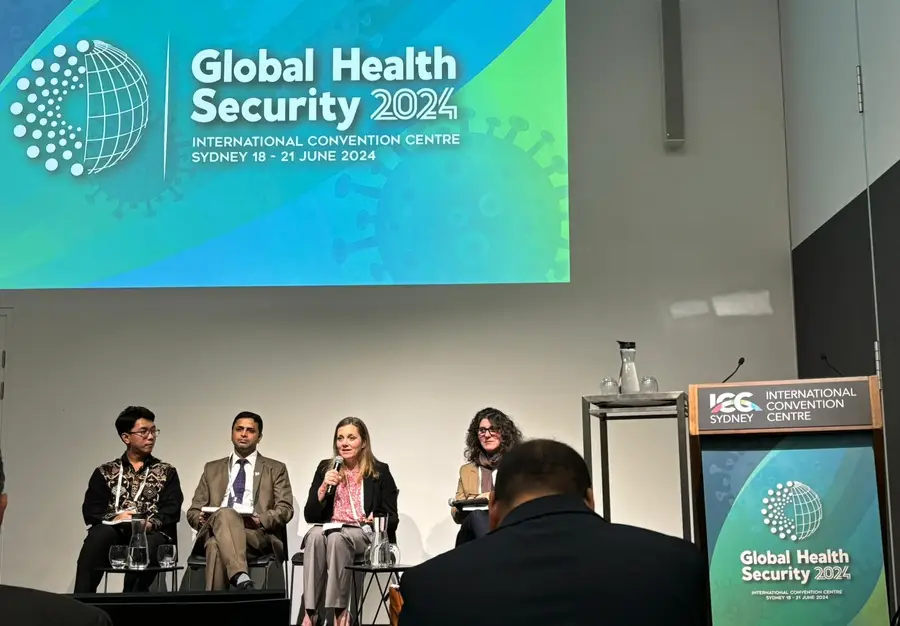
Last month, RTI International joined nearly 1,200 public health experts at the Global Health Security Conference 2024 (GHS 2024) to discuss pressing issues and innovative solutions in preventing, detecting, and responding to the next pandemic. RTI presented several key projects and research initiatives that highlight our commitment to advancing global health security and fostering resilient health systems.
Here’s a closer look at the work we shared and 5 insights we took from the Global Health Security Conference:
1. Learn from Past Outbreaks to Strengthen Future Health Security
As we continue to reflect on the global response to the COVID-19 pandemic, we must intentionally take the lessons learned from the recent pandemic and all outbreaks and apply them to strengthening health security for the future. This year’s conference featured a rich library of learnings from past global outbreaks such as the COVID-19 pandemic and Ebola outbreaks including RTI’s presentations on surveillance and detection lessons from past outbreaks in Honduras and across the African continent including:
- Lessons learned from Ebola outbreaks in Sierra Leone, Liberia, Ghana, Ethiopia and Kenya to inform COVID-19 response.
- Collaboration with the Honduran Ministry of Health to evaluate Honduras’ COVID-19 surveillance system provided clear system improvements.
- Evaluating the lessons from a pilot electronic real-time surveillance system in the Democratic Republic of the Congo (DRC).
Now, we must put these lessons into practice, a core value of RTI’s mission and global health security strategy.
2. Recognize the Diverse Origins of Disease Through One Health
GHS 2024 highlighted that preventing severe health security threats begins with addressing the upstream drivers of pathogen spread, such as environmental changes and interactions between humans, animals, and plants (otherwise known as One Health).
Through our event-based surveillance pilot in the DRC, we demonstrated that engaging community volunteers and focal points across sectors to detect and report unusual events, including natural disasters and animal deaths, can provide advance warning of a larger health emergency. To do this effectively, there needs to be proactive coordination and collaboration between workforces and professionals themselves. RTI presented recommendations from our biodiversity and conservation work in Southeast Asia on how we can remove barriers between public health and environment professionals and maximize investments across sectors through One Health.
3. Prioritize Communities in Health Security Strategies
A bottom-up approach to health security, from communities to national health systems, leads to more effective and equitable strategies by involving the people who are most impacted. The effects of COVID-19 misinformation were felt worldwide, pointing to the need for community-contextualized information and transparent communication from trusted sources. RTI demonstrated an example of this from the community networks we supported in the DRC to engage and actively listen to communities for more informed COVID-19 risk communications that both addressed misinformation and enhanced the informal to formal health system feedback loop.
4. Mitigate Conflict During Health Emergencies
With specific sessions on conflict and health, the conference emphasized that health emergencies can have severe repercussions on peace and security, weakening governments’ ability to maintain stability in health services during outbreaks. Our work contributed to this link between unrest, conflict and violence, and health threats through a comprehensive framework designed to measure various types of unrest and violence that can occur during public health events. By analyzing data from the COVID-19 pandemic, we also highlighted the critical role that social stability plays in effective health response and the importance of addressing social determinants of health in emergency planning and response strategies.
5. Commit to Political Collaboration for Health Security
The conference was attended by leaders of Ministries of Health, National Public Health Institutes, Centers for Disease Control, Defense Ministries, and other cross-sectoral entities, demonstrating a strong commitment to collaboration in the face of future pandemics. Political commitment and collaboration are essential in times of emergencies such as pandemics but also as we seek to better prevent and mitigate the impacts of future health emergencies. GHS 2024 was a glimpse of how effectively we can prevent, detect and respond to the next health threat by unifying political leaders across sectors from the global south and north.
By integrating these takeaways into the architecture for global health security, we will be better prepared for the next health threat and ensure more resilient health systems and communities. RTI International remains committed to advancing these efforts and working collaboratively to protect health for all.
Learn more about RTI’s work in responding to disease outbreaks and emerging pandemic threats.